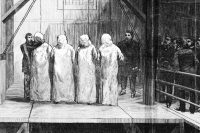
Dystra ekonomiska framtidsutsikter och åtstramningspolitik har fört USA och Europa samman på nytt.
For her first overseas trip as secretary of state, Hillary Clinton went to Asia. For his first trip, John Kerry chose Europe. His choice is partly a result of his strong connections across the Atlantic and partly a move against the frustrations U.S. diplomats have faced in places like Beijing. Kerry’s choice also speaks to a remarkable narrowing of the Atlantic, which culminated in Obama’s championing of a transatlantic free-trade agreement in his State of the Union address this month.
Only 10 years ago, Europe and the U.S. were meant to be so different that not only did they have different views, but they viewed each other as if from different planets. Politically and militarily, the author Robert Kagan claimed, Americans were from Mars and Europeans from Venus. American commentators used to routinely denounce European economies for being closed, backward-looking and missing the wave of the future. Germany was still seen as the sick man of Europe, and it was the subject of ridicule for the way it was wedded to an industrial economy in a post-industrial age. What a difference a decade can make.
As a European in Washington, I have spent much of the past few weeks listening to pillars of the American foreign policy and economic establishments. I am struck by how many of today’s U.S. debates mirror those in Europe. These two giant economies are no longer as different as they once were.
In the foreign policy and security fields, no one seems to be coming from Mars anymore. The U.S. is debating how to avoid war and how to save money. Everyone agrees that ‑ whether or not there is a sequester ‑ there will be deep cuts in the Pentagon’s budget, with tens of thousands of soldiers and marines facing decommission. On Friday, a seminar at the Brookings Institution, which gathered soldiers, senators and academics, seemed to agree that future administrations should not call on the armed forces to intervene directly in other countries’ civil wars, to build democracy or engage in lengthy peacekeeping operations. As Michelle Flornoy, a former Pentagon official who many people want in the sidelines behind Defense Secretary-nominee Chuck Hagel, said, “We don’t want to be the world’s policemen.” In the place of major ground wars, participants said they want to rely on drones, alliances and rapidly conducted offshore interventions.
Where the Clinton and Bush administrations were apostles of a flat world of financial and technological globalization, the Obama administration has a more nuanced position. While Obama does not advocate protectionism, he worries that trade with China has de-industrialized the American economy, hollowed out middle-class jobs and depressed wages. (This paper on the “China Syndrome” seems to be required reading in Obama’s economic circles.) As a result, administration officials are talking about energy independence, re-industrialization, re-shoring and fair trade. Where once the U.S. saw Germany as being trapped in auto parts and metal bashing at a time when high-tech services were the future, people in D.C. now talk about the German economy with reverence.
J. Robinson West, who advises most of the big energy companies as head of PFC Energy, predicts that the U.S. will be producing more energy than Saudi Arabia and Russia within two decades. But the Obama administration seems less excited about energy exports than the promise that cheap gas could lead to a manufacturing revival. The administration seems receptive to arguments put forth by Dow Chemical’s president, Andrew Liveris, that being cautious about granting export licenses could help create jobs in the U.S. Obama thinks a manufacturing revival is a key element of enhancing America’s ability to innovate – whether it is the chance to develop patents, innovations in production or create higher-wage technical jobs. Above all, Obama, influenced by the German example, thinks advanced manufacturing can create export-led growth.
The transatlantic trade deal knits the economic and geopolitical strands of the new Obama vision together. The idea of signing a free-trade deal with America’s most reliable allies should provide a more solid economic platform for the West’s attempts to support a liberal geopolitical order. Signing a deal with rich European Union countries that have high wages and even higher environmental standards accords with America’s new philosophy of globalization. Such a transatlantic deal – particularly if linked with hopes for trade deals in Asia (such as the TransPacificPartnership) ‑ will help the rich world to impose regulatory standards on rising powers by making access to this new mega-market dependent on meeting these standards.
People used to ask: What would bring the two sides of the Atlantic together – reminding them of their common interests or reinforcing the thick web of values that they share in common? The truth is that while values (guns, god and GMOs) and interests (Iraq, Israel-Palestine) have divided Europeans and Americans, it is austerity and the prospect of decline that have brought them back together.
This was obvious in one of Hillary Clinton’s last speeches as secretary of state, in which she explained that the U.S. is not planning to pivot away from Europe to Asia, rather with Europe to Asia. Her speech also illustrated the continuing differences between the European and American strategies for dealing with (relative) decline.
When it comes to global order, many Europeans distinguish between establishing a rules-based order and maintaining perpetual American primacy. They worry that Washington’s multi-partner strategy might prolong the latter at the expense of the former. One example is Washington’s nuclear deal with India, which allowed a great power that is friendly with Washington to break the rules. In spite of Washington’s new debate about austerity, there continue to be differences over how to deal with global economic imbalances.
Oscar Wilde once famously joked that England and America are divided by a common language. But today, though Americans sound more German by the day, it is Washington and Berlin that seem divided by their common concepts (which may explain why Kerry began his journey in London rather than Berlin).
In spite of these differences, there does seem to be a remarkable convergence of views across the Atlantic, and a real chance to move beyond tactical cooperation on issues such as Libya and Syria toward a joint strategy. It is certainly better to be divided by a common language than living on separate planets.
Mark Leonard is a British journalist and author.
Fotnot: Texten är tidigare publicerad på Mark Leonards blogg på Reuters.com och publiceras med tillstånd av författaren (the text has previously been published on Mark Leonard’s blog at Reuters.com and is re-published by kind permission by the author. Reuters retain the copyright.).
Följ Dagens Arena på Facebook och Twitter, och prenumerera på vårt nyhetsbrev för att ta del av granskande journalistik, nyheter, opinion och fördjupning.

































